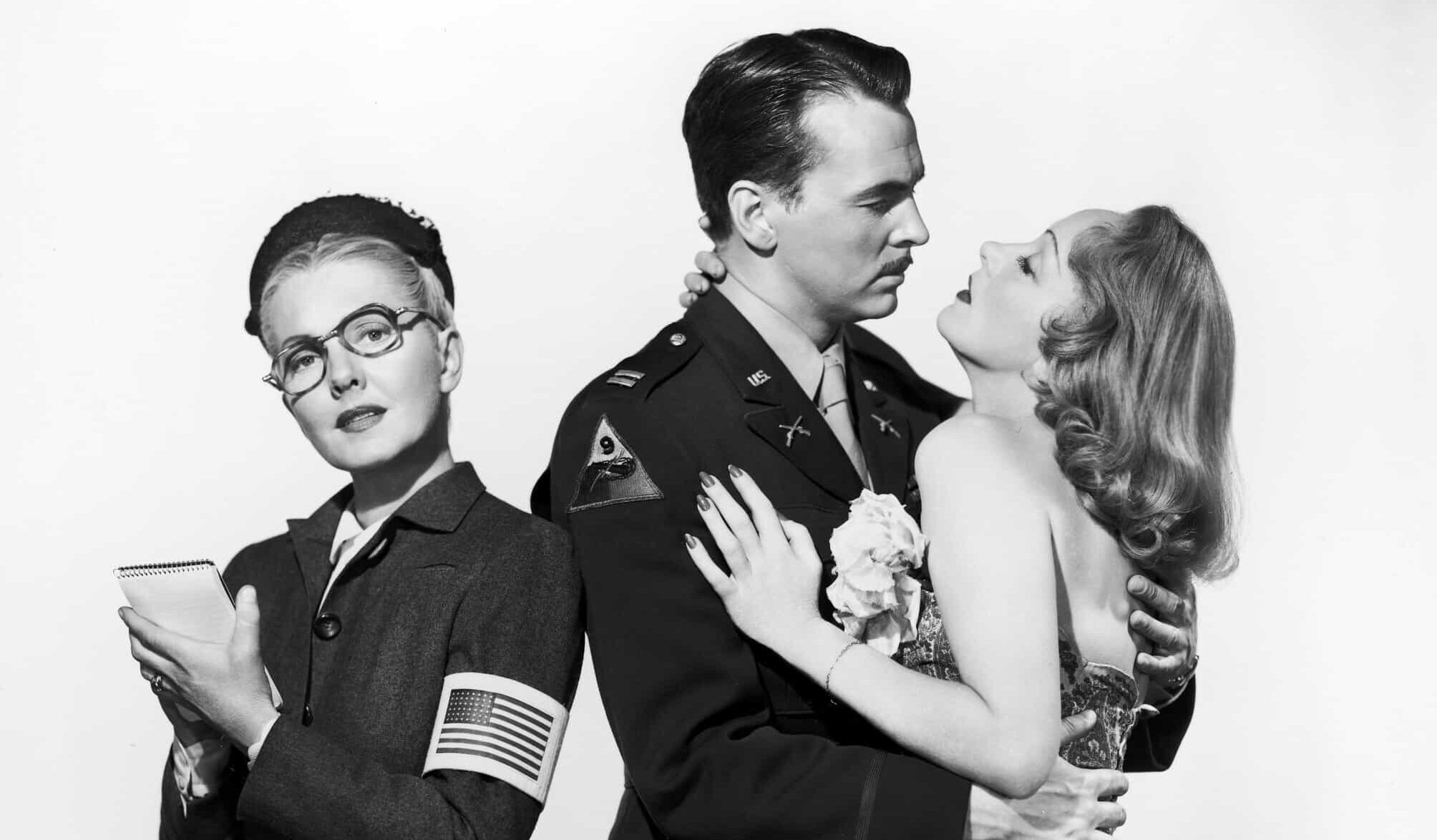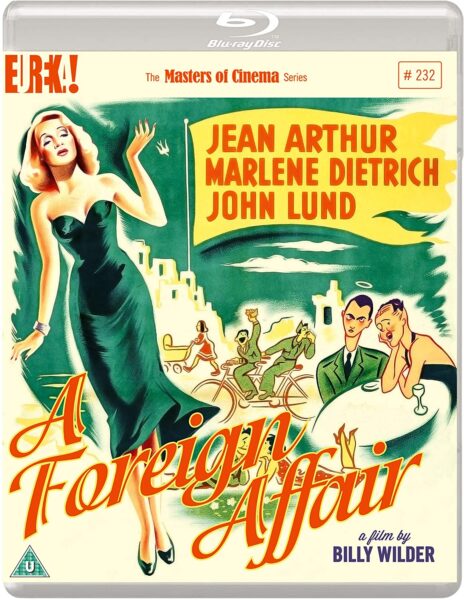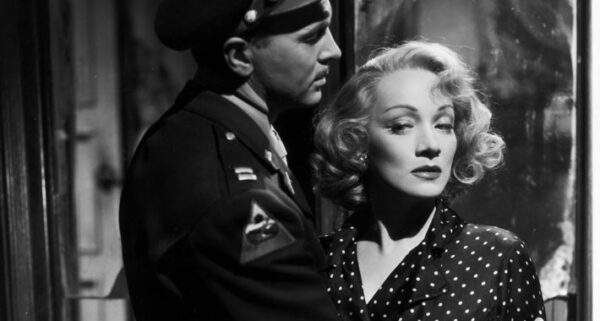
A Foreign Affair (1948) Blu-ray Review

Before and once the Nazis came to power in Germany in 1933 many directors, actors and film folk moved to Hollywood from Germany and then the rest of Europe once the Second World War had begun, thereby draining Europe of a large part of its artistic and cinema talent. Among those who fled included Fritz Lang, Curt and Robert Siodmak, Peter Lorre and Jean Renoir. Meanwhile, after the end of WWII some filmmakers took advantage of the cityscapes of post-war Europe, in what came to be derivatevely called ‘rubble films’. First and foremost among those were three films by Roberto Rossellini: Rome – Open City (1945, shooting started days after the German army left Rome on 4th June 1944), Paisa (1946) and Germany, Year Zero (1947). Others that followed include The Third Man (1949) shot among the ruins of Vienna, The Big Lift (1947), Berlin Express (1948), one of the few widely known East German films, Murderers Are Among Us (1946) and the little seen The Devil Makes Three (1952) with Gene Kelly, which was filmed in a post-war Munich, Salzburg and the ruins of the Berghof in Berchtesgaden. Even as late as 1961, Judgement at Nuremberg (1961) was filmed in part in the still ruined Berlin and Nuremberg. Two emigrees who worked on another film shot among the ruins of Berlin were Marlene Dietrich and Billy Wilder. Dietrich had left for Hollywood in 1930 and was already a huge star there when the Nazis came to power, despite Joseph Goebbels’ alleged entreaties for her return. Wilder, meanwhile, an Austrian Jew who had worked in Berlin, fled first to France and then Hollywood.

Seen on the new Eureka Entertainment Blu-ray release, the opening shots of A Foreign Affair (1948) look impressive. It begins with a US plane carrying government officials through the clouds when we see from above the devastated Berlin. The passengers, as a contempory cinema going audience would have done at the time, look awestruck and dumbfounded on the destruction below, a projection of Wilder’s own impressions on first seeing the city for the first time in many years from the air in 1945, a city he had lived, worked and made pleasure in the late 1920s. The passengers include a (Republican) congresswoman from Iowa, Phoebe Frost (Jean Arthur) who is arriving in Berlin to report on troop morale. When other passengers invite her to look at the ruins below, she slowly puts her belongings away and prepares for landing, initially uninterested until she looks out of the window and says “golly”, clearly shocked by what she sees.
On arrival, the delegation are greeted with full military honours and are introduced to Captain Johnny Pringle (John Lund), a fellow Iowan who presents him with a chocolate cake, apparently from his sweetheart back in Iowa which we later see sold on the black market. Much is accurately made of the black market in the film with scenes of open selling between US troops, Soviet soldiers and Berliners alike. US soldiers can be seen selling watches to Russian soldiers, which was quite the commodity in post-war Berlin and were much desired among Russian soldiers as they demanded “uhrer”. Captain Pringle, meanwhile, is having an affair with a German night club singer, Dietrich’s Erika Von Schluetow (clearly a former aristocratic name), living in a half ruined house where stockings and a mattress from Johnny are gratefully received. Before long it is Arthur’s character as the prudish official who comes to the fore, horrified with the fraternisation between American soldiers and the Berlin women, beautifully played out in a tour through the ruins led by Colonel Plummer (played by Millard Mitchell, best known as R.F., the film producer in Singin’ in the Rain, 1952) as he talks in GI speak. The plot progresses with Phoebe Frost investigating Erika’s apparent Nazi past with hierarchy and the American soldier in a relationship with her, who is unknowingly right under her nose as Johnny romances Phoebe to put her off the scent.
Seen as a ‘rubble film’, it’s one very different from any of the others in that it is a comedy. Wilder has great fun with his insider understanding of Berliners, playing on the natural fraternisation (this was following the tragedy of the mass rapes that took place after the liberation of the city by Soviet forces and alluded to by Dietrich’s character) and as such the film was heavily criticised by the US military and banned from being seen by the overseas forces. Dietrich nevertheless was reluctant to play the role, fearing that her playing a former Nazi darling and now opportunist would tarnish her image, having worked hard to move away from any association with the Nazis which she never had in the first place (the only association largely due to Goebbels having said he admired her and wanted her to return to Germany). She revoked her German citizenship and became an American in 1939 (as had Wilder) and worked hard on the front entertaining the troops and was sometimes even asked to work as an interpreter. But Dietrich did it for Billy and now, in her mid-40s when she made the film, still has that eternal beauty of hers, hard features and with a face of experience, is perfectly cast, her face captured well by Charles Lang’s camera; not least of all in the songs she sings in the club: ‘Black Market’, ‘Illusions’ and ‘Ruins of Berlin’, songs written by Friedrich Hollander who had written some of her earlier best loved songs. No one could have sung these songs like Dietrich and became standards in her stage performances. In many ways Wilder’s later 1961 film, One, Two, Three (1961) works as an interesting continuation of this film, with the two having a good deal in common, both in subject and stylistically and, like A Foreign Affair, has a strong comedy element among the serious background. In the later film, James Cagney plays a loud mouthed American capitalist coca-cola executive in West Berlin. His assistant, Schlemmer still clicks his heels out of habit and his ditzy daughter has run off with a young communist idealist student (Horst Buccholz) and has problems getting her back from the Soviet sector (the Berlin Wall was erected during the making of the film).
As ever with Eureka Entertainment, the film is given first class treatment. The sharp HD looks good, although there is some pixilation in tracking shots. Extras include two interesting radio performaces of A Foreign Affair with Dietrich, Lund and Rosalind Russell playing the Jean Arthur character, an interesting extract interview with Wilder carried out by Volker Schlöndorff, showing off much of his humour and wit as he discusses making the film. There is also an audio commentary by film historian John McBride who talks affectionaltely about Arthur whom he knew personally and had interviewed Wilder on several occasions. Another standout extra is Kat Ellinger’s visual essay as she looks at the relationship of Wilder and Dietrich with Berlin and how their period in the city in the 1920s informed their contributions to A Foreign Affair.
Chris Hick
